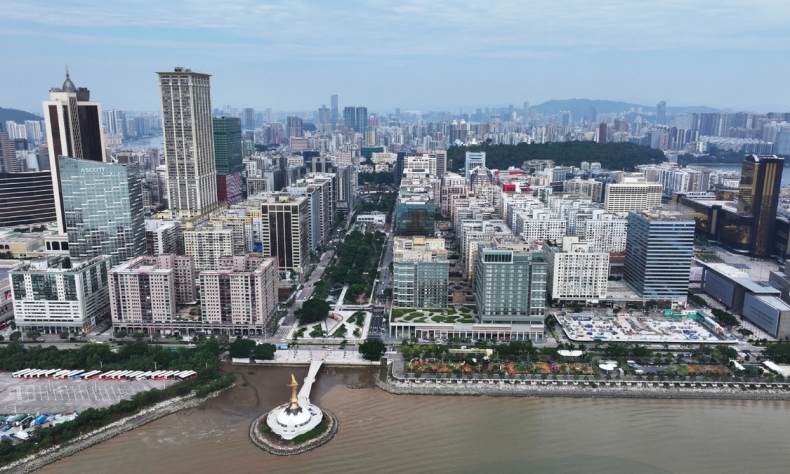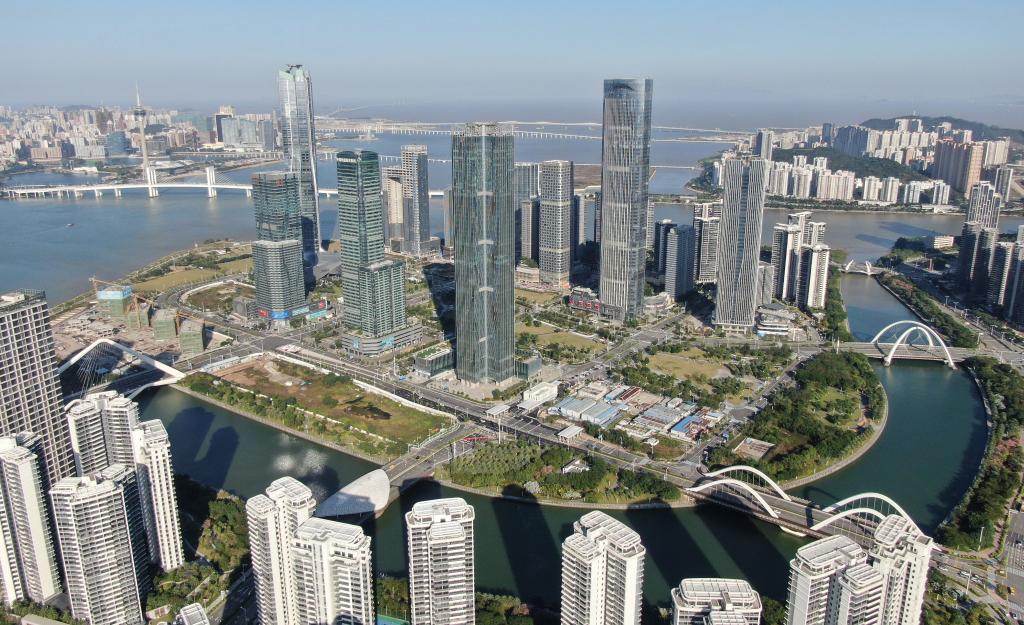New Engine for Macao’s Economic Diversification

Digital integration with the mainland injects new momentum into Macao’s efforts to branch out from volatile tourism and gaming industries.
Digital trade has become a new engine for the world economy and China’s growth. Taking the opportunity of the development of the Guangdong-Macao In-Depth Cooperation Zone in Hengqin, Guangdong, Macao is integrating with the digital development of the Chinese mainland to inject new momentum into its economic diversification.
Harnessing its resources
Macao is an international free port as well as a popular destination for global tourists. Although its economy is small, the special administrative region boasts high per capita GDP, and is one of the wealthiest places worldwide. Macao’s per capita GDP in 2023 was US $66,800, far surpassing its neighboring metropolises Shenzhen and Hong Kong. In 2022, its secondary and tertiary industries accounted for 9.5 percent and 90.1 percent of the regional GDP, respectively. The regional economy is heavily dependent on the tertiary industry, which is predominantly the gaming industry in Macao’s case.
With the support of the central government, Macao has adopted a “1+4” development strategy. The “1+4” development strategy aims to enrich Macao’s function as a center for integrated tourism and leisure, while facilitating the development of four nascent industries, namely, traditional Chinese medicine and “big health;” modern financial services, hi-tech and new technology; conventions and exhibitions; and culture and sports.
Although Macao’s service trade competitiveness is leading globally, it is mainly concentrated in the tourism and gaming sectors, which are highly volatile. In contrast, its digital service trade has much room to grow. The service industry in Macao is not only well-developed, but also highly globalized. From 2002 to 2023, Macao’s total imports and exports of services increased from US $5.59 billion to US $44.19 billion, with an average annual growth rate of 10.3 percent.
The ratio of trade in services to GDP in Macao is relatively high, reaching a historic peak in 2012 of 96.4 percent. It subsequently declined then rebounded to 93.9 percent in 2023 as the trade in services recovered.
Tourist and gaming services are the main sources of exports in services in Macao. From 2008 to 2019, the proportion of exports in tourist services in Macao’s total exports in services remained above 90 percent. In 2023, the figure was 88 percent. In terms of imports, business services accounted for 61 percent, whereas imports in tourist services were 27 percent.
According to the Global Service Trade Development Index Report 2024 released by the Chinese Academy of International Trade and Economic Cooperation, Macao’s comprehensive development level in trade in services is ranked ninth in the world. The special administrative region led the world in terms of per capita trade in services, the proportion of trade in services in total trade, the competitiveness of trade in services, the proportion of trade in services in the added value of the service industry, and the proportion of the service industry in total regional GDP. However, Macao primarily trades traditional services, and the potential of digital services is yet to be unleashed.

New opportunities
Currently, digital trade has become a new growth engine for international trade.
According to statistics from the World Trade Organization, global exports of digitally delivered services reached US $4.25 trillion in 2023, up 9 percent year on year, accounting for over 50 percent of global exports of services. The global market size of business-to-consumer cross-border e-commerce in 2021 was US $785 billion. It is predicted that by the year 2030, it will have reached US $7.9 trillion, with an average year-on-year growth of 29.3 percent, which will far exceed the growth rate of the world economy and world trade, providing new channels for global trade cooperation.
As the largest digital trade economy in the world and with the strongest competitiveness, the U.S. boasts a number of world-class digital platform companies, such as Amazon, Google, and Facebook, actively promoting American rules and standards around the world.
Singapore, an international trade center, has been promoting its digital economy, and upgrading itself into a global digital trade center. With digital trade partnership agreements, and new template rules for digital trade in place, the city-state is building up a global network for digital trade cooperation.
Shanghai has built world-class information infrastructure with the highest international standards, establishing a system for high-level opening-up of digital trade. The Shanghai Data Exchange has been built to accelerate the development of Shanghai as an international hub port for digital trade.
Beijing is establishing itself into a benchmark city for the digital economy. It has created a pilot area for fundamental data systems, and the Beijing International Data Exchange to explore systems for data property right authentication and trading, and promote free flow of data as a factor of production at home and abroad.
Focusing on the construction of a global digital trade center, Hangzhou held the Global Digital Trade Expo, and is developing cross-border e-commerce and trade in digital services, aiming to be a leading source for innovation on digital trade worldwide.
Macao’s development of a digital free port gives it unique advantages, helping it integrate with international high-standard rules and regulations for digital trade, and making its digital connectivity to the world distinctive. Apart from some exceptions stipulated in Macao’s Personal Data Protection Act, data in the special administrative region can be freely exchanged across the border.

Macao’s accession to the Portuguese-speaking countries’ data protection network is facilitating its data exchanges with Portuguese-speaking countries. Using Portuguese-speaking countries as a base, Macao will continue to expand the data market in Europe, Latin America, and Africa, constructing a digital connectivity network of countries and regions participating in the Belt and Road cooperation.
Additionally, Macao owns educational resources, such as the University of Macau, City University of Macau, and Macau University of Science and Technology, along with a number of industry associations and intermediary organizations related to the digital economy and digital trade. These provide the foundational conditions for the region to promote international cooperation in the digital economy and the development of digital trade.
New momentum
Chinese President Xi Jinping stressed that the original intention for developing the Guangdong-Macao In-Depth Cooperation Zone is to create conditions for the diversified industrial development of Macao. Hengqin can play a greater role in developing digital trade and promoting appropriate economic diversification of Macao. Coordinated development of digital trade between Macao and Hengqin can also be achieved in the process.
The general plan for building the Guangdong-Macao In-Depth Cooperation Zone proposes establishing a China-Portugal international trade center and an international hub port for digital trade to promote the digital transformation of traditional trade. It urges efforts to bring in the trading headquarters of multinational companies and global traders, align with high-standard rules for digital trade, and build an international hub port for digital trade.
For this, the infrastructure for digital trade must be strengthened and a technologically advanced, world-class, and interconnected digital infrastructure should be created. It is necessary to align with international high-standard rules for digital trade, explore mechanisms for efficient, convenient and safe cross-border data flow, and create an enabling environment for digital trade.
Based on Hengqin’s foundation in industrial development, efforts should be made to develop the international data industry cluster, and diversify the application scenarios where data empowers industrial development. It is also necessary to build an international data industrial park and a platform for cross-border data trading for comprehensive development of cross-border e-commerce, digital content, data trade, and trade digitalization.
Fianally, it is necessary to establish an extensive network for international and domestic cooperation, make use of Macao’s connectivity with the Belt and Road and Portuguese-speaking countries, and build links, bridges and channels for international and domestic cooperation on digital trade.
Targeted support policies should be introduced for the development of digital trade based on major projects, key trade models, application scenarios, and key countries and regions.
Li Jun is director of the Institute of International Trade in Services under the Chinese Academy of International Trade and Economic Cooperation.
 Facebook
Facebook
 Twitter
Twitter
 Linkedin
Linkedin
 Google +
Google +










